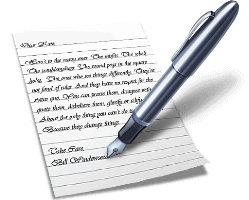 Today, the importance of an excellent personal statement continues to rise. It serves as a crucial document, acting as the bridge between you and your dreams of entering a prestigious educational institution or securing that dream job. As you do this critical phase, it's crucial to understand why a superb personal statement holds the key to unlocking your future success. The significance of your personal statement lies in its ability to make a profound first impression. Admissions officers, hiring managers, and scholarship committees are bombarded with countless applications, each vying for their attention. Your personal statement is your initial opportunity to distinguish yourself from the sea of applicants, to capture their interest, and to compel them to read further. It is your introduction to the decision-makers who hold the keys to your future. Moreover, a well-written personal statement allows you to showcase your unique qualities, experiences, and aspirations as it provides a canvas upon which you can paint the portrait of your individuality, sharing your passions, achievements, and dreams. It is a window into your world, offering a glimpse of the person behind the resume or transcript. This document is your voice, your chance to tell your story and persuade those in authority that you are the right fit. Besides making a memorable impression, your personal statement plays a crucial role in addressing any weaknesses or gaps in your application. It's an opportunity to provide context, to explain any academic setbacks, employment gaps, or other perceived shortcomings. With our guidance, these hurdles can be transformed into stepping stones, demonstrating your resilience, growth, and determination. As we look deeper into the details of personal reports, it becomes evident that it's not merely about words on paper. It's about strategically positioning yourself as an ideal candidate, aligning with the values and goals of the institution or company you are applying to, and crafting a narrative that resonates with the reader. In this process of self-presentation, our team of experts stands ready to guide and support you. Our mission is to help you harness the power of a splendid personal statement, ensuring that you present yourself in the most compelling and persuasive manner possible.
Today, the importance of an excellent personal statement continues to rise. It serves as a crucial document, acting as the bridge between you and your dreams of entering a prestigious educational institution or securing that dream job. As you do this critical phase, it's crucial to understand why a superb personal statement holds the key to unlocking your future success. The significance of your personal statement lies in its ability to make a profound first impression. Admissions officers, hiring managers, and scholarship committees are bombarded with countless applications, each vying for their attention. Your personal statement is your initial opportunity to distinguish yourself from the sea of applicants, to capture their interest, and to compel them to read further. It is your introduction to the decision-makers who hold the keys to your future. Moreover, a well-written personal statement allows you to showcase your unique qualities, experiences, and aspirations as it provides a canvas upon which you can paint the portrait of your individuality, sharing your passions, achievements, and dreams. It is a window into your world, offering a glimpse of the person behind the resume or transcript. This document is your voice, your chance to tell your story and persuade those in authority that you are the right fit. Besides making a memorable impression, your personal statement plays a crucial role in addressing any weaknesses or gaps in your application. It's an opportunity to provide context, to explain any academic setbacks, employment gaps, or other perceived shortcomings. With our guidance, these hurdles can be transformed into stepping stones, demonstrating your resilience, growth, and determination. As we look deeper into the details of personal reports, it becomes evident that it's not merely about words on paper. It's about strategically positioning yourself as an ideal candidate, aligning with the values and goals of the institution or company you are applying to, and crafting a narrative that resonates with the reader. In this process of self-presentation, our team of experts stands ready to guide and support you. Our mission is to help you harness the power of a splendid personal statement, ensuring that you present yourself in the most compelling and persuasive manner possible.
Why you need to come up with a great personal statement;
- First Impressions Matter: It is often the first thing admissions officers or potential employers read as it serves as your introduction and sets the tone for the rest of your application. When written well, it can capture their attention and make a positive first impression, increasing your chances of success.
- Showcasing Your Unique Qualities: A great confidential statement allows you to highlight your individuality which is an opportunity to express what makes you special and different from other applicants. Our personal statement writing help makes it easy for you to identify and emphasize your strengths, talents, and experiences that will resonate with the decision-makers.
- Addressing Weaknesses and Gaps: If you have academic or professional weaknesses or gaps in your resume, it can provide context and reassure the reader of your commitment and potential. We can help you strategically address these issues, turning them into strengths.
- Aligning with the Institution or Company: Each college, university, or employer has its unique culture, values, and expectations, and tailoring your personal statement to align with their specific requirements and mission can significantly boost your chances of acceptance thus we assist you in researching and incorporating these elements effectively.
- Demonstrating Your Passion: Passion is a powerful motivator, and it can be a deciding factor in your application's success which is why our experts help you convey your genuine enthusiasm for the subject or position you're applying for, making your personal statement memorable.
- Highlighting Relevant Experiences: Your past experiences, whether academic, volunteer, or work-related, play a crucial role in your personal statement hence we can guide you in selecting the most relevant experiences and presenting them in a compelling way that showcases your skills and qualifications.
- For Showcasing a Compelling Narrative: A personal statement should read like a story that engages the reader from beginning to end and our our expert writers excel in creating narratives that captivate and resonate with the audience, making your personal statement memorable and persuasive.
A good personal statement is an indispensable tool in the competitive field of college admissions and job applications. It's not just a piece of writing; it's your opportunity to make a lasting impression and convey your unique qualities to decision-makers. As we've discussed, the importance of this document cannot be stretched, and the benefits of seeking professional personal statement help are numerous. Custom Writing Bay stands ready to assist you in this crucial task. We understand the facts of personal statement scripting, from capturing attention with a compelling introduction to aligning your narrative with the institution or company's values. Our services encompass not only expert writing but also meticulous editing and proofreading, ensuring that your personal statement is polished to perfection. Your future success is too important to leave to chance. Let our team of experienced professionals help you shine and increase your chances of acceptance or job placement by submitting a personal statement that stands out from the rest and opens doors to new opportunities.
How to Write a Persuasive Personal Statement – Expert Advice
 When it comes to this ever-competitive field of academia and the professional world, the power of an impressive personal statement is critical. It serves as your voice, your story, and your chance to make a compelling case for yourself to admissions officials or potential employers. It's that one piece of the puzzle that can set you apart from countless other applicants, making it an indispensable part of your progress toward higher education or career advancement. But here's the catch: writing an effective personal statement is far from an effortless task. It demands introspection, eloquence, and the ability to encapsulate your life's experiences and aspirations within a limited word count. It requires finesse in storytelling, clarity in expression, and the art of persuasion. Your personal statement is the narrative of who you are, what you've achieved, and where you aspire to go. Our aim is to demystify the process of preparing a personal statement that not only meets the expectations of admissions committees and hiring managers but exceeds them. We'll take you through the elaborate process of self-reflection, strategic writing, and the meticulous structuring of your personal statement. Our experts will provide you with the tools and insights necessary to do this transformative writing process as well as the best strategies to initiate your personal statement effectively, captivate your reader's attention, and ensure that your story resonates on a profound level. We'll focus on the art of designing your personal statement, elucidating the importance of a compelling introduction, coherent body paragraphs, and a memorable conclusion. And perhaps most importantly, we'll emphasize the significance of drafting your personal statement from scratch, avoiding the pitfalls of plagiarism, and harnessing the power of authenticity. Whether you're an aspiring college student seeking admission to your dream institution or a seasoned professional aiming to secure a coveted job position, join us on this insightful expedition into the ideology of personal statements. Let us help you create a record that not only stands out but leaves a lasting impression; one that ensures your unique story is heard and appreciated in a world filled with voices vying for attention.
When it comes to this ever-competitive field of academia and the professional world, the power of an impressive personal statement is critical. It serves as your voice, your story, and your chance to make a compelling case for yourself to admissions officials or potential employers. It's that one piece of the puzzle that can set you apart from countless other applicants, making it an indispensable part of your progress toward higher education or career advancement. But here's the catch: writing an effective personal statement is far from an effortless task. It demands introspection, eloquence, and the ability to encapsulate your life's experiences and aspirations within a limited word count. It requires finesse in storytelling, clarity in expression, and the art of persuasion. Your personal statement is the narrative of who you are, what you've achieved, and where you aspire to go. Our aim is to demystify the process of preparing a personal statement that not only meets the expectations of admissions committees and hiring managers but exceeds them. We'll take you through the elaborate process of self-reflection, strategic writing, and the meticulous structuring of your personal statement. Our experts will provide you with the tools and insights necessary to do this transformative writing process as well as the best strategies to initiate your personal statement effectively, captivate your reader's attention, and ensure that your story resonates on a profound level. We'll focus on the art of designing your personal statement, elucidating the importance of a compelling introduction, coherent body paragraphs, and a memorable conclusion. And perhaps most importantly, we'll emphasize the significance of drafting your personal statement from scratch, avoiding the pitfalls of plagiarism, and harnessing the power of authenticity. Whether you're an aspiring college student seeking admission to your dream institution or a seasoned professional aiming to secure a coveted job position, join us on this insightful expedition into the ideology of personal statements. Let us help you create a record that not only stands out but leaves a lasting impression; one that ensures your unique story is heard and appreciated in a world filled with voices vying for attention.
Best ways to start writing a professional personal statement;
- Self-Reflection Is the First Step: Before putting pen to paper or fingers to keyboard, take some time for self-reflection and look into your life experiences, goals, and values. What drives you? What sets you apart? Knowing how to write a persuasive personal statement helps in understanding yourself which is key to a personal statement that resonates.
- Capture Attention with a Compelling Hook: Your opening sentence should be a captivating hook that draws your reader in. Whether it's a thought-provoking quote, an intriguing anecdote, or a bold statement, make sure it's relevant to your story and sets the tone for your personal statement.
- Show, Don't Tell: Instead of listing your accomplishments and qualities, show them through vivid storytelling. Use specific examples that highlight your skills, character, and growth; you can describe challenges you've overcome and how they've shaped you.
- Be Genuine and Sincere: Authenticity matters hence the need to be true to yourself and your experiences to avoid exaggeration or embellishment, as it can come across as insincere; admissions officers and employers appreciate honesty.
- Focus on Your Unique Journey: Highlight what makes you outstanding. What experiences, perspectives, or skills do you bring to the table? Embrace your individuality and demonstrate how it will contribute to the institution or company you're applying to.
- Connect Your Past to Your Future: Explain how your past experiences have led you to your current goals and aspirations. Establish a clear and logical connection between your background and what you hope to achieve.
How should you structure a personal statement to appear professional?
- Introduction: Start with a strong, attention-grabbing opening that introduces your topic and sets the tone for your personal statement which is where you should establish your unique voice and capture the reader's interest.
- Body Paragraphs: The body of your personal statement should consist of several paragraphs that provide depth and context to your story. Each paragraph should focus on a specific aspect of your life or experiences hence the need to make sure to transition smoothly between paragraphs for a cohesive narrative.
- Transition Sentences: Use transition sentences to guide your reader through your personal statement smoothly which helps connect ideas and maintain a logical flow in your writing.
- Conclusion: Conclude your personal statement with a powerful closing statement that reinforces your main points and leaves a lasting impression, and avoid introducing new information in the conclusion; instead, sum up your key messages.
- Check Length: Keep your personal statement within the specified word or page limit. Adhere to any formatting guidelines provided by the institution or employer since transparent writing is often more impactful.
Why it is crucial to compose a personal statement from scratch;
This allows you to create a unique and authentic narrative or story. Admissions committees and employers read numerous personal statements, and they can spot generic or recycled content from a mile away. When you write from scratch, you have the opportunity to showcase your individuality, experiences, and aspirations in a way that no one else can. Formulating a completely new personal statement enables you to tailor your message to the specific institution or company you're applying to. Each organization has its own values, culture, and expectations. By starting from a clean slate, you can align your personal statement with their particular requirements and demonstrate your genuine interest in being a part of their community. Writing from scratch also allows you to showcase your growth and development and your personal statement is not just a static snapshot of who you are; it's a dynamic representation of your journey. By reflecting on your experiences and articulating your goals, you can illustrate how you've evolved and what you have to offer in the future. It ensures that your personal statement is fresh and relevant as life experiences change, and so should your personal statement. Even if you've written one in the past, it's essential to update it to reflect your current accomplishments, aspirations, and values. Copying or heavily borrowing from online templates, sample personal statements or other sources can lead to serious consequences since plagiarism not only tarnishes your credibility but also jeopardizes your chances of admission or employment. This is a valuable opportunity for personal growth and self-discovery as the process of introspection, storytelling, and self-expression can be a transformative experience. It allows you to gain a deeper understanding of yourself, your goals, and your motivations, which can be invaluable as you do your educational or professional studies.
Constructing a swaying personal statement is a multifaceted work of effort that demands careful consideration, creativity, and authenticity. We've explored the best ways to commence your writing process, emphasizing the importance of self-reflection, engaging hooks, and genuine storytelling. These initial steps serve as the foundation upon which you'll build a compelling narrative. Structurally, we've discussed the significance of a well-organized introduction, body, and conclusion, all while maintaining a concise and error-free personal document. These elements collectively contribute to a professional and impactful personal statement. Equally crucial is the decision to write your personal statement from scratch. This approach ensures uniqueness, alignment with your chosen institution or employer, and, most importantly, the avoidance of plagiarism. Your personal statement is not just a piece of writing; it's a reflection of your identity, aspirations, and progress. As you do the personal statement, keep in mind that it's not merely about securing a place in a school or landing a job; it's an opportunity for personal growth, self-discovery, and self-expression. Embrace it with authenticity, and let your story shine through. Your personal statement has the power to open doors and shape your future, so make it count.





